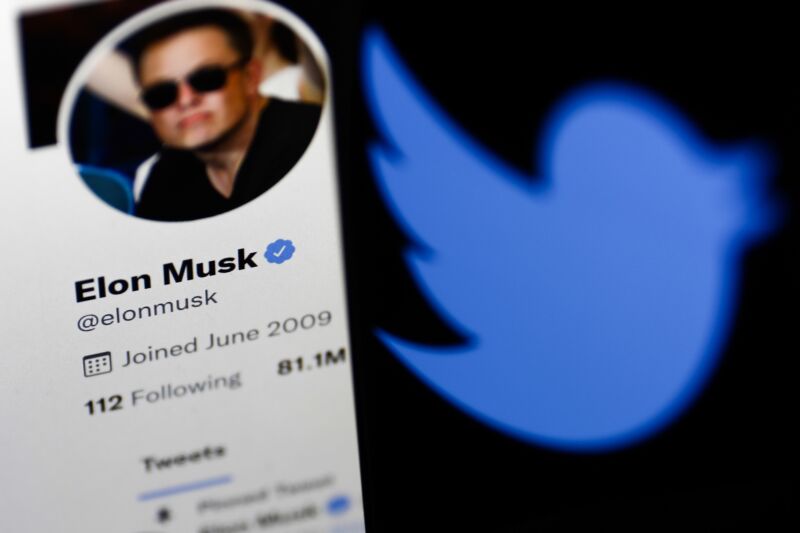
Elon Musk will not be joining Twitter’s board of directors, dropping out of a deal that would have prohibited him from buying more than 14.9 percent of the company’s stock. Musk had agreed to join the board after purchasing 9.2 percent of Twitter’s stock, but Twitter CEO Parag Agrawal last night announced that Musk pulled out of the pending agreement.
Agrawal posted a note he sent to Twitter employees, which said:
We announced on Tuesday that Elon would be appointed to the Board contingent on a background check and formal acceptance. Elon’s appointment to the board was to become officially effective 4/9, but Elon shared that same morning that he will no longer be joining the board. I believe this is for the best. We have and will always value input from our shareholders whether they are on our Board or not. Elon is our biggest shareholder and we will remain open to his input.
Musk revealed a week ago that he had purchased nearly 73.5 million Twitter shares, which are now worth over $3 billion. If the SpaceX and Tesla CEO had followed through on the agreement to join Twitter’s board, he would have had to abide by a stock-purchasing limit detailed in a Securities and Exchange Commission filing.
“For so long as Mr. Musk is serving on the Board and for 90 days thereafter, Mr. Musk will not, either alone or as a member of a group, become the beneficial owner of more than 14.9 percent of the Company’s common stock outstanding at such time, including for these purposes economic exposure through derivative securities, swaps, or hedging transactions,” Twitter wrote in the SEC filing.
Analyst: Musk likely to build “active stake”
Musk staying off the board of directors sets up “a ‘Game of Thrones’ battle between Musk and Twitter, with the high likelihood that Elon takes a more hostile stance toward Twitter and further builds his active stake in the company,” Wedbush analyst Dan Ives wrote, as quoted by Barron’s and other media outlets.
Before offering Musk a spot as a director, Agrawal and board members “had many discussions about Elon joining the board, and with Elon directly,” Agrawal wrote in his note to employees about Musk pulling out of the deal. “We also believed that having Elon as a fiduciary of the company where he, like all board members, has to act in the best interests of the company and all our shareholders, was the best path forward.”
Agrawal further wrote, “There will be distractions ahead, but our goals and priorities remain unchanged. The decisions we make and how we execute is in our hands, no one else’s.”
New Musk tweet asks, “Is Twitter dying?”
On Saturday morning, Musk retweeted a list of the top 10 Twitter accounts by number of followers, adding, “Most of these ‘top’ accounts tweet rarely and post very little content. Is Twitter dying?”
Musk “spent much of the weekend tweeting criticisms, suggestions, and apparent jokes about Twitter,” The Wall Street Journal noted. The tweet asking if Twitter is dying was still up today, but Musk deleted others, “includ[ing] one proposing that people who sign up for Twitter Blue, the company’s premium subscription service, should receive an authentication checkmark. Another deleted tweet proposed that Twitter convert its San Francisco headquarters to a homeless shelter ‘since no one shows up anyway.'”
Board seat would “diminish” Musk’s voice
According to Reuters, sources said “that Musk had asked Twitter for a board seat even before the company’s invitation.” Reuters also paraphrased anonymous sources as saying that “news of Musk taking a board seat had some Twitter employees panicking over the future of the social media company’s ability to moderate content.”
Before revealing his 9.2 percent stake in the company, Musk wrote tweets questioning Twitter’s commitment to “free speech principles.”
CFRA Research analyst Angelo Zino last week wrote that “Musk’s actual investment is a very small percentage of his wealth, and an all-out buyout should not be ruled out.” Following Musk’s reversal on joining Twitter’s board, Zino wrote, “We had thought the equity cap and board seat was originally intended to handcuff Musk in many respects and think he is unlikely the type of individual who will now just sell his stake and walk away.”
“I think what he realized is that by being on the board, his voice will diminish, and that’s absolutely the last thing he wants,” Reuters quoted Wells Fargo analyst Brian Fitzgerald as saying.
https://arstechnica.com/?p=1847163

